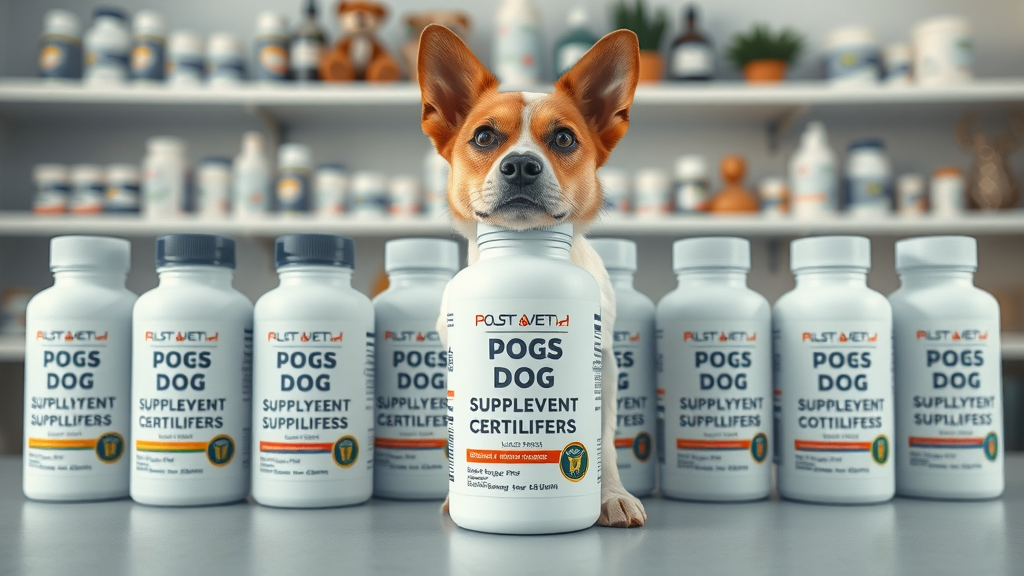Did you know that over 60% of American dogs are missing at least one essential nutrient in their daily diets? Many loving pet parents meticulously choose premium dog food, yet still overlook crucial gaps in canine nutrition. Dog nutrition and natural supplements can powerfully transform your furry friend’s health, energy level, and longevity—if you know what to look for. Read on to discover actionable steps that keep tails wagging and pets thriving.
Why Dog Nutrition and Natural Supplements Matter: Surprising Facts Every Pet Owner Needs
- Recent surveys reveal that over 60% of American dogs lack at least one essential nutrient in their daily diets.
- Discover why a single ‘dog supplement’ can help bridge nutritional gaps and why ‘dog vitamins’ are critical for long-term canine health.
- Explore how ‘dog supplements’ and ‘natural supplements’ have reshaped pet longevity and well-being.
Optimal dog nutrition and natural supplements are not just trendy buzzwords—they can be life-changing for your pet. Recent studies indicate a shocking percentage of dogs live with undiagnosed deficiency, which can result in early signs of arthritis, allergies, and immune system compromise. By integrating a high-quality dog supplement or targeted dog vitamins , pet parents can proactively protect their dog's health from the inside out.
The rise of supplements for dogs and natural supplements —from fish oil to specialized multivitamins—has significantly contributed to better overall wellness, improved longevity, and increased resilience against health issues like heart disease. Understanding why supplementation matters can help you make informed choices that have a lasting positive impact on your dog's day-to-day quality of life.

Comprehensive Overview of Dog Nutrition and Natural Supplements
Understanding Core Nutritional Needs for Dogs
- Macronutrients, micronutrients, and water: the complete dog nutrition spectrum
- The role of balanced nutrition in disease prevention
Every dog needs a complete and balanced diet, combining macronutrients (proteins, fats, and carbohydrates), micronutrients (vitamins and minerals), and essential hydration. Without the right blend, even the best formulated dog food can fall short. That’s where dog supplements fill in the gaps.
Micronutrients like zinc, iron, and calcium play pivotal roles in bone growth, nerve function, and immunity, while fatty acids support cognitive function and skin health. The right nutritional balance directly combats inflammation, reduces the risk of heart disease , boosts the immune system, and helps senior dogs stay healthy longer. Whether you feed commercial, raw, or homemade dog food , supplementing can be a game changer, especially as dietary needs evolve with age and health conditions .
Dog Supplement Versus Dog Vitamins: Essential Differences for Pet Parents
- What is a ‘dog supplement’ and when is it necessary?
- The vital function of ‘dog vitamins’
- Introduction to ‘supplements for dogs’ and customization by ‘health conditions’
Many pet owners ask, “What’s the real difference between a dog supplement and dog vitamins ?” Simply put, supplements for dogs provide targeted nutrients beyond daily food, supporting specific needs like joint health , digestion, or allergies, while dog vitamins deliver a baseline of essential vitamins such as A, B-complex, E, and D for overall wellness.
When is a supplement necessary? If your dog is aging, coping with health conditions , or on a restrictive diet ( homemade dog food or prescription dog food), specialized natural supplements or blends customized by health concern can bridge gaps. The decision to add new dog vitamins or supplements should always be guided by a veterinarian familiar with your dog’s complete health profile.
Types of Dog Nutrition and Natural Supplements: Choosing the Right Formula
Fish Oil and Omega-3 Fatty Acids: Proven Benefits for Dogs
- Anti-inflammatory properties for joint health and coat shine
- Best practices for safe supplementation—what makes fish oil effective as a dog supplement
Fish oil is a powerhouse ingredient used in many top dog supplements . Rich in omega-3 fatty acids like EPA and DHA, fish oil supports everything from joint health to cognitive function. Regular intake leads to shinier coats, improved skin condition, and decreased inflammation, particularly valuable for senior dogs and breeds prone to arthritis.
But not all fish oils are created equal. High-quality oils are purified to remove toxins and are dosed carefully for size and age. Key best practices include selecting products labeled for pets, starting with small doses, and consulting your vet to minimize risks of overdosing and avoid interactions with other medications or supplements. A reputable dog supplement will always include an analysis of EPA and DHA content for optimal results.

Joint Health Support: Glucosamine and Chondroitin in a Dog's Diet
- How glucosamine and chondroitin benefit joint health
- Choosing the right natural supplement blend
Glucosamine and chondroitin are the dynamic duo of joint health support. These compounds, naturally found in cartilage, are frequently depleted as dogs age. Supplementing with them promotes resilience in joints, reduces pain, and increases mobility for dogs with arthritis or those predisposed to hip and joint challenges.
Not all blends are equal. The best natural supplement formulas combine glucosamine and chondroitin with MSM or turmeric for added anti-inflammatory and antioxidant benefits. When choosing a supplement for dogs, look for transparent ingredient lists and positive customer reviews—especially if your furry friend has a history of joint problems or is a large breed or senior dog.
Natural Supplement Innovations: Probiotics, Antioxidants, and More
- How probiotics promote immune system resilience
- Role of antioxidants in managing canine health conditions
- Link between vitamins and supplements and disease prevention
Probiotics for dogs are gaining traction, offering a safe, natural way to balance gut bacteria, enhance nutrient absorption, and foster a stronger immune system . Regular supplementation has been linked to fewer digestive upsets and a happier appetite, even in picky eaters.
Antioxidants—such as vitamin E, C, and plant-based compounds—neutralize free radicals and lower inflammation that may lead to chronic disease or aging symptoms. Combining natural vitamins and antioxidants in your dog’s diet ensures strong internal defense mechanisms, helping prevent illnesses from allergies to serious autoimmune reactions.
Top Considerations When Selecting Dog Nutrition and Natural Supplements
Reading Dog Supplement Labels and Certifications
- Understanding third-party certifications (NASC, AAFCO)
- Key ingredients to seek and avoid in supplements for dogs
When purchasing any dog nutrition and natural supplements, label literacy is crucial. Always prioritize products with third-party endorsements, like the National Animal Supplement Council (NASC) or American Association of Feed Control Officials (AAFCO). These seals guarantee thorough quality checks, standardized dosages, and ingredient safety.
Scan labels for actionable ingredients: clear omega-3 (from fish oil), veterinarian-recommended vitamins, and absence of artificial flavors or preservatives. Beware of vague "proprietary blends" that mask low-quality ingredients. Quality dog supplements should list each component by name, provide a guaranteed analysis, and show a lot number for traceability—because your pet deserves only the safest, most effective options.

Matching Supplements for Dogs to Life Stage and Special Health Conditions
- Tailoring dog vitamins for puppies, adult dogs, and seniors
- Custom solutions for allergies, skin sensitivity, and autoimmune issues
- Integrating joint health protocols using natural supplements
The ideal supplement for dogs is not one-size-fits-all. Puppies require DHA-rich fish oil and calcium, adults do best with balanced multivitamins, and senior dogs benefit from joint-friendly blends and antioxidants. It’s important for every pet parent to reassess supplement routines at each life stage for maximum effect.
Special health conditions —from allergies to chronic inflammation or skin sensitivity—call for unique formulas, often featuring turmeric, quercetin, or green-lipped mussel extract. If your senior dog struggles with mobility, integrating a natural supplement crafted for joint health can make a noticeable difference. Always discuss your tailored regimen with a veterinarian, especially when combining multiple products or addressing chronic dog health concerns.
Ultimate List: Must-Have Dog Nutrition and Natural Supplements for Home Use
- Essential multivitamins and targeted formulas
- Trending ‘natural supplement’ categories dog owners swear by
- Unique supplements for dogs: stress, digestion, cognition
Every modern pet parent should have a few must-have dog nutrition and natural supplements on hand:
- Multivitamins with A, B, C, D, and E for day-to-day health
- Fish oil and other fatty acids for heart, brain, and skin
- Probiotics for dogs to stabilize digestion and immunity
- Specialty stress-reducing formulas with L-theanine or chamomile
- Antioxidant-rich blends—think blueberries, turmeric, and green-lipped mussel extract—shown to combat age-related decline
- Digestive aids for dogs on high-protein or homemade diets
Pet owners emphasize the game-changing effects of these supplements for dogs, highlighting fewer digestive issues, shinier coats, and better mobility. Choose formulas with transparent sourcing and veterinarian approval to ensure your pup receives lasting support—whether you’re managing a special need or simply want your dog to stay healthy for years to come.
Dog Nutrition and Natural Supplements: Benefits, Risks, and Safe Dosages
| Supplement | Key Benefit | Typical Dose (per 30 lbs) | Potential Interactions |
|---|---|---|---|
| Fish Oil | Reduces inflammation, improves skin, aids joint health | 1000 mg daily | May interact with anticoagulants |
| Glucosamine & Chondroitin | Cartilage support, reduces arthritis pain | 500 mg / 400 mg daily | No major interactions |
| Probiotics | Gut health, immune system boost | 1-2 billion CFU daily | Rare; consider other antibiotics present |
| Antioxidants | Neutralizes free radicals; slows aging | Varies—included in blends | Monitor for excess vitamin E, A, or selenium |
- Side effects and warning signs of over-supplementation
- Why consulting a veterinarian is critical before starting new supplements
While dog nutrition and natural supplements provide remarkable advantages, too much of a good thing can cause problems. Watch for upset stomach, lethargy, or coat changes as potential warning signs. Overuse of certain vitamins and supplements—especially fat-soluble ones like vitamin A or D—can lead to toxicity. Never mix multiple supplements for dogs without asking your veterinarian.
"When it comes to your dog, natural supplements should complement a complete diet—never replace it." — Dr. Emily Thornton, DVM

How to Introduce Dog Nutrition and Natural Supplements to Your Pet
- Gradual integration and monitoring for reactions
- Incorporating supplements for dogs into meals
- Tips for picky eaters: ensuring consistency
The safest way to add supplement for dogs to your routine is gradual integration. Start with half the recommended dose, observing for reactions over 7-14 days. Watch for subtle improvements in coat shine or energy, but also remain alert to digestive shifts or behavioral changes. Consistency is key—incorporate supplements into regular dog meals or hide them in a favorite treat for picky eaters.
If your dog is especially hesitant, crush tablet supplements and mix with a small spoonful of peanut butter or wet food. Every new supplement should be introduced separately, so you can pinpoint any allergy or sensitivity. Your veterinarian can suggest the ideal schedule for your specific dog, particularly if your homemade dog food lacks certain vital vitamins or minerals.

Cost Breakdown: Investing Wisely in Dog Nutrition and Natural Supplements
| Product | Type | Main Benefit | Price / Month |
|---|---|---|---|
| Omega-3 Fish Oil | Liquid or Softgel | Shiny coat, joint support | $18 – $28 |
| Joint Support Chews | Chewable tablet | Pain relief, improved mobility | $22 – $30 |
| Probiotic Powder | Powder | Gut health, immune system | $15 – $25 |
| Multivitamin Blend | Tablet | Daily balanced nutrients | $20 – $28 |
- Assessing value versus long-term health outcomes
- How to spot marketing hype and select effective products
Choosing the right dog nutrition and natural supplements also means making smart investments. The price range depends on formulation, ingredient quality, and brand reputation, but in many cases, a slightly higher up-front cost can translate to fewer vet visits and better quality of life for your pet.
Be wary of flashy marketing claims, and always check for lab certification, transparent labeling, and reputable third-party reviews. Evaluate value in terms of ingredient quality, clinical evidence, and whether your dog’s key health concerns are adequately addressed. Avoid paying premiums for generic “superfood” blends with unclear dosages or proprietary filler ingredients—your pet deserves reliability and results, not hype.
User Reviews and Real Pet Owner Experiences with Dog Nutrition and Natural Supplements
- Top-rated ‘dog supplements’ for anxiety, digestion, and joint health
- Verified consumer stories: noticeable improvements and potential drawbacks
Pet parents across the country rave about the life-changing value of the right dog supplement —particularly for issues such as anxiety, mobility, or digestive health. Multivitamin chews, softgels for joint health , and probiotic blends make frequent appearances in top-rated reviews, as do natural remedies for stress-prone dogs.
Many reviewers notice a rapid boost in energy, a softer and shinier coat, or relief from recurring skin and stomach problems after a month of consistent use. Drawbacks commonly mentioned include picky eaters needing time to adjust, or mild digestive changes with initial introduction. However, overwhelmingly, customers see dog nutrition and natural supplements as an investment that pays off in a happier, healthier dog.
"Switching to natural supplements made my dog more lively and eased his recurring skin problems. Worth every penny!" — Lisa, Labrador Owner

Expert Recommendations: Best Practices for Dog Nutrition and Natural Supplements
- How leading veterinarians approach dosage and combinations
- Avoiding common mistakes: ingredient interactions, timing, and brands
- Trusted sourcing for safe, lab-tested supplements
Top veterinarians recommend a conservative, phased approach to introducing new vitamins and supplements. Begin with a single product targeting your dog’s most pressing need, observe the effect over several weeks, and only then consider adding another supportive formula. Avoid combining two products containing the same active ingredient (like fish oil or vitamin D) to prevent over-supplementation.
Only select supplements for dogs from brands with clear batch testing, traceable ingredients, and established safety records. Ask your vet for recommendations or consult the NASC product database. Timing also matters; for example, give probiotics during or after meals to maximize absorption. By following these expert-backed strategies, you’re ensuring your pet receives only the best dog nutrition and natural supplements—no fillers, no risk, just positive results.
People Also Ask: What Supplements Should I Add to My Dog's Food?
- Fish oil, glucosamine and chondroitin, probiotics, and antioxidant blends are among the best supplements for dogs. Selection should always be tailored to age, breed, and existing health conditions to maximize benefits.
Adding functional supplements to your dog’s daily meals can offer support for joint mobility, digestion, coat quality, and immune health. Always choose targeted blends that match your dog’s unique needs, and consult your veterinarian before adding new products, especially if your pet has underlying health conditions.
People Also Ask: What Supplements Should My Dog Have?
- Core dog vitamins such as vitamin E, B-complex, and A, plus natural supplements for joint health or immune support, typically ensure a balanced diet for most dogs. Consultation with a vet is recommended for a customized plan.
Dog vitamins are the foundation, but additional natural supplements —tailored for joint, skin, or digestive health—often help fill essential nutrient gaps left by commercial or homemade diets. Each dog is different, so individualized guidance from your veterinarian will ensure optimal health outcomes.
People Also Ask: What Are Natural Supplements for Dogs?
- Natural supplements for dogs include plant-based antioxidants, omega-3 fish oil, probiotics, turmeric, and green-lipped mussel extract. These support wellness without harsh chemicals and promote whole-body health.
The latest generation of natural supplements is designed with gentle, proven ingredients that work in harmony with your dog’s physiology. From anti-inflammatory turmeric to marine-sourced omega-3 fatty acids and potent antioxidants, these products boost vitality with minimal side effects.
People Also Ask: What Supplements Should I Put in My Homemade Dog Food?
- Homemade dog food often requires added calcium, vitamin D, omega-3 fatty acids, and a full-spectrum multivitamin supplement. Always work with a veterinary nutritionist to prevent imbalances and deficiency.
When feeding homemade dog food , it’s vital to address common deficiencies, especially in calcium, vitamin D, and essential fatty acids. A high-quality multivitamin specifically designed for dogs should fill in the remaining dietary gaps. Always seek the input of a qualified nutritionist to craft a complete and balanced meal plan and avoid unintended health risks.
Frequently Asked Questions on Dog Nutrition and Natural Supplements
- How do I know if my dog needs a supplement? Watch for signs like dull coat, low energy, joint stiffness, or digestive issues. A veterinarian can run simple tests to identify nutrient gaps and recommend targeted support.
- Can I combine different natural supplements? Yes, but always do so under veterinary supervision to prevent overlapping ingredients or negative interactions. Introduce new supplements one at a time for clear monitoring.
- Are there risks to long-term supplement use? Some fat-soluble vitamins can build up in your dog’s system, and cumulative dosing may cause toxicity. Choose supplements designed for daily use with clear dosage limits and consult your vet.
- What's the best way to transition to new dog vitamins or supplements? Go slowly: integrate each supplement separately over a one to two-week period, monitoring for side effects or improvements, and adjusting the routine as needed.
Bonus Resources: Best Practices, Additional Tables, and Guides on Dog Nutrition and Natural Supplements
| Brand | Standout Ingredient | Certification | Life Stage |
|---|---|---|---|
| Paws & Shine Omega+ | Fish Oil (EPA/DHA) | NASC | Adult, Senior |
| Nature’s Relief | Probiotics | AAFCO | All life stages |
| Active Bones Advanced | Glucosamine & Chondroitin | NASC | Senior |
| Calm Paws Chews | Chamomile, L-theanine | NASC | Adult |
- Checklist for Choosing the Right Supplement:
- Check for reputable certifications (NASC, AAFCO)
- Research ingredient transparency and dosing
- Read verified user reviews for safety & results
- Daily Supplement Intake & Signs of Improvement:
- Record daily supplements and monitor coat, mood, and stool
- Note increased energy or improved mobility within four weeks
- Give your pup the relief they deserve—explore natural remedies trusted by dog lovers for calm, comfort, and wellness.
- Discover safe, effective natural remedies to soothe your dog’s common health issues—no harsh chemicals, just gentle care from nose to tail.
- Tired of meds with side effects? Learn how natural remedies can support your dog’s health the gentle, holistic way.
Conclusion
For a thriving, happy dog, invest in trusted dog nutrition and natural supplements . Begin with small doses, monitor progress, and partner with your vet to tailor nutrition—your pet will reward your care with energy, comfort, and years of joyful companionship.
To further enhance your understanding of dog nutrition and natural supplements, consider exploring the following resources:
- “Dog Supplements: What Are They? What Functions Do They Serve?” ( akc.org )
This article provides an in-depth look at various dog supplements, including glucosamine, fish oil, antioxidants, and probiotics, detailing their functions and potential benefits for canine health.
- “The Best Natural Supplements for Dogs” ( petinsurancereview.com )
This resource discusses essential natural supplements such as omega-3 fatty acids, antioxidants, and probiotics, explaining their roles in supporting immune function, cognitive health, and overall vitality in dogs.
If you’re serious about optimizing your dog’s health through nutrition and natural supplements, these resources will provide valuable insights and guidance.
 Add Row
Add Row  Add
Add 








Write A Comment